|
Mumbling, bumbling and floating aimlessly like its protagonist, Wah Do Dem, despite its geographic relocation from America to Jamaica, is a visually superior but by the numbers slacker film. Though let it be noted that the film, co-directed by Ben Chance and Sam Fleischner, makes as good a stab at it as any recent entry into a now depressingly distended sub genre.
As with the re-emergence of the Lollapalooza music festival in name only, every time a new slacker film is added to the already swelling ranks, it smacks of little else than nostalgia for the nineties golden era of American indies without ever coming close to capturing what was in the ether and the tissue of the times of VHS favourites like Slacker, Reality Bites, Clerks, Empire Records and lesser known, but just as deserving titles such as Kicking & Screaming, Barcelona, The Doom Generation and Spanking the Monkey. This was the generation of filmmakers who first diagnosed what would become known as the quarter-life crisis on film, with sympathetic cautionary tales for floundering under-25s, that were defined by universality, regardless of sex or the socio-economic background of their characters.

You can wag your finger at me and call it mumblecore or behead cinema all you want, but what's in a name? It's nothing new. The likes of Andrew Bujalski might be just as prolific, but unlike Richard Linklater before them, this new breed are less concerned with having something to say than they are about lo-fi, improvised opacity set to an alt soundtrack, all of which amounts to a half-hearted John Cassavetes style throwback to anything that isn't now.
The more things change, the more they stay the same. Only difference is, the girls got hotter and started saying a lot less. By which I mean, the new re-packaged, musically moulded, exclusively New York-based slacker is no longer unattractive. He or she no longer takes the 'misery loves company' tact of hermetically sealing themselves away from the outside word in their malaise; ritualistically regurgitating esoteric texts (Whit Stillman), working their way through every single title at the video store (Kevin Smith) or simply refusing to leave a shielded college campus existence (Noah Baumbach). This latest crop of slackers are way too beautiful and trendy to stay indoors and looking this good requires frequent trips out to snap up last season's collections at H&M and Topman, ironic confirmation that their thrift-store-looking threads are that much more vintage. Wordless navel-gazing has never looked better.
The spotless digital photography of Wah Do Dem and another recent slacker, Bradley Rust Gray's still-to-be-released-in-the-UK, The Exploding Girl are testament to this. Treading in others' steps on an all-too-similar journey of un-enlightenment, those same steps can look that much less worn with a focus on visuals over content and it's here that Chance and Fleischner's attempt at revitalizing tired tropes really works.
Effective as their geographic and visual switch-up is at genre displacement, this approach can only hold your attention for so long when you're spending so much time with one character whose rather lacking in that department. As the fulcrum of an on foot visual panorama, eventually the viewer will demand this character be examined in some way, and the directing duo mistakenly let their protagonist's empty-headiness inform their script, a decision the film is never able to rise above or recover from.

After being dumped by his girlfriend Willow, two days before their romantic Caribbean cruise getaway is due to set sail, Max (Sean Bones) tries in vain to rustle up a last minute travel buddy amongst his friends, all of whom refuse him (including one who drunkenly accepted the previous night) and we're treated to a breathlessly amusing montage of those doors being slammed – if they're not stuck in inescapable nine-to-five minimum wage grinds working at the local coffee house, they're convincing him they're on a tight deadline when they're actually just laying about in bed or blocking out the concerns of the world (and Max's urgent phone calls) in the throes of a heavy make-out session. Inevitably, Max is forced to go it alone and what he originally envisaged as a week of getting naked with his girlfriend results in his being hemmed in with a boatload of over-sixty-fives. After much drunken excess, being hounded by a lonely homosexual suitor from the upper deck gym and failing to ingratiate himself with the younger group of the on-board entertainers, Max disembarks in a Jamaican port, looking for something more authentic which will stop him obsessing over his break-up. Befriending all the wrong people and failing to ask the right questions before it's too late, Max is robbed, gets on the wrong bus back to port, misses his boat and spends the rest of a trip chock-full of false starts and stupid mistakes, trying to reach the American embassy in Kingston. Alarm bells regarding Max's sense of awareness when it comes to geography, relationships and himself start ringing before he's even left New York, so there's much fun to be had anticipating the moments you'll be audibly groaning and shouting at the screen for him to wake-up as he finds himself in one tragically comic, increasingly sticky predicament after another.
Of course, as these situations get hairier, it helps if we care and want Max to make it home safely. Initially, Bones is refreshingly unaffected in a way that gets us on-side early on; likeably gawky, slack-jawed and perpetually looking like he's shaking off sleep from a long bus ride, Max is more reminiscent of Linklater's half-baked Texans, despite the neon green hipster shades that mark him out as a mumbling New Yorker. While he's cut from the right cloth and perfectly communicates the stranger in a strange land through screwed up facial expressions and awkward body language, the script really lets its leading man down by only ever outlining a character; sticking Max in a second gear which shifts between amiable and gormless. Bones is never given the chance to test or expand beyond these emotions, which gives rise to too many questions. What did his girlfriend see in him in the first place? What about the fact that he's going on this trip to get her out of the city – is he doing this blindly just to make her feel better or does he know he's on the verge of losing her? And why hasn't he researched or cultivated any interest in the place he's going to beyond downing a six-pack of Red Stripe?
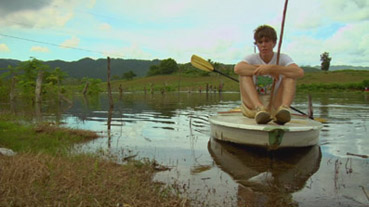
The press notes credit Max as a Brooklyn musician, as opposed to the wannabe strummer recording his musical mopings on Garage Band in his bedroom, which shows the directors up to be just as lacking in awareness as Max, considering who they're working with and the pride of place the film's advertising affords the music. None other than Jazz musician Norah Jones plays Willow, and one of the DVD special features even has Jones dueting with Bones in his-real-life band. That both actors possess musical talents that could have been incorporated to cement the attraction in their relationship is a missed opportunity for understanding our travelling companion, and one that might have gone so far as to make Max's utter lack of street smarts and basic common sense much more forgivable if his character were a music connoisseur who could stand to gain something from his dangerous detours as he's exposed to the local music scene along the way. As it is, the full-moon rendition of renowned reggae group, The Congos, plays like exotic set dressing, a music video breather to break up the repetition of Max's increasing bad luck. During this performance, Max is situated as the tourist very much on the outside looking in, not moved or transformed in any way by what he observes, just cluelessly absorbing it. Even having to walk through the streets half-naked without shoes after losing all his possessions is something Max takes on the chin with incredulous passivity. Sure, he gets worked up, but all it takes is the next dodgy distraction offering him another Red Stripe to get him calm him down. Generally awkward but never conveying the appropriate sense of disoriented panic in the performance as things go from bad to worse, it's the visuals that sell the sense of Max barely keeping his head above water. Chance and Fleischner put us on wobbly legs the second Max leaves dry land, omitting establishing shots and refusing to hold takes long enough to give a sense of the ship's layout. The quick-cutting of blink-and-you'll-miss-them moments of Max getting progressively more inebriated serve as indistinct glimpses of locations that seem to bear little spatial relationship to one another, as if the ship is inhaling and exhaling between expansive dinning rooms and narrow corridors.
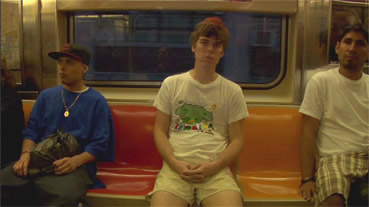
In the Jamaican scenes, Max is beset by hustlers, always obscuring the view of his surroundings in tight walk n' talk shots that never account for the distance travelled, the way Wim Wenders did in the most noteworthy scenes from 1975's Wrong Move, putting equal emphasis on terrain traversed as he did conversation. The blinding colours of the encroaching foliage in both foreground and background further obfuscate our perception of landscape; townships giving the impression of having organically sprang up without any thought or planning, just wherever the foliage is not so dense that those spaces aren't uninhabitable. There's no doubt that Chance and Fleischner are on to something here. Choosing not to focus on the failures of nerve and communication that commonly bookmark mumblecore, they seem at times to purposely make Max as blank a slate as possible so that our attention is easily pulled elsewhere, towards topography and music, which would all be well and good if any of this had the desired fundamental effects on Max who remains a point-of-view avatar throughout, a chess piece the directors can move from place to place and on to the next musical sequence between cuts without any of it ever feeling organically formed. This isn't Max's story, it's Chance and Fleischner's. Despite the daring change of locale and how to go about presenting it, the directors seem all to aware of the genre they're working in, chained to its demands when they think they're paying homage. A final shot of a bedraggled Max on a New York subway aims for ambiguity, but his expression unchanged from how it was when we first met him makes it clear that like the many slackers before him, he hasn't learnt a thing from his experiences.
In Garth Edwards' recently released sci-fi hybrid Monsters, slacker alumni Scoot McNairy (In Search of a Midnight Kiss) stars as one half of the central couple who at the end of their journey through the creature infested 'infected zone' come to realize that they have more in common with the world of the monsters (where their relationship was forged) than they do with the estranged lives they left behind the wall that now quarantines the US. Wah Do Dem, hints at a similar transformation in its closing scenes when Max befriends one of the many Jamaican 'monsters' who tries to rob him. According to Chance and Fleischner, if they're not thieves or con men Jamaicans are at best untrustworthy flakes or off-their-rocker Rastas. The hoodlum who just moments ago had a knife to Max's belly now offers him protection navigating the mean streets of Kingston after it becomes obvious that this tourist has nothing left of value to steal. The hoodlum takes this opportunity to assure Max that his violent outburst was due to early morning crankiness and a lack of food and that even though he robs people, he's a decent person who makes good on his word – and he does, more than can be said for the friend who promises to accompany Max on the cruise before dumping him the next morning without a second thought or apology.
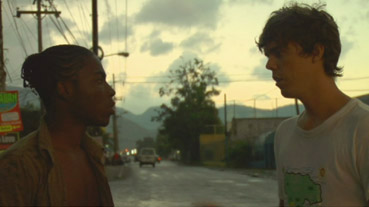
The idea of Max going through all these harsh, life-threatening episodes in order to learn how alienated he is from his city, friends and girlfriend, would have resulted in a journey far more intriguing than the end result: it would have dawned on him how New York has stifled him and left him unprepared to face anything outside it; that his friends are only acquaintances and – if his musical background had been properly established – that he doesn't need to depend on Willow to express himself artistically, that the break-up can in fact fuel his creativity. Rather than have Max sitting on the sidelines whenever the music takes center stage, these sequences would have been a great opportunity for the notes to cut through the noise of his relationship and for him to see it for what it is, perhaps in elliptical shards of flashback, unfolding in much the same snapshot way Max finds his way around the ship. As this realization begins to crystallize, Chance and Fleischner possibly could have taken this even further, contrasting Max's present dire straits with the latte sipping comfort of Willow's post break-up life back in New York (which we get one solitarily unmotivated glimpse of). Perhaps all this would have contributed to a more complete, desolate sense of what Max imagines the cruise will be like verses what he ends up getting, or more likely, this is just my way of lodging a complaint about the false advertising that had me excited about the film in the first place. Genuinely impressed with Norah Jones' bewitching turn in Wog Kar Wai's unfairly maligned My Blueberry Nights, I was eagerly anticipating the songstress' return to the big screen after seeing her positioned front and center on the film's poster and all we're rewarded with is barely a cameo and not so much a tinkle of the keys. What better way for Jones to continue to prove herself as an actress by taking baby steps outside her natural comfort zone? To cast a musician in a musically driven film only to throw her away before we get to the music seems self-sabotaging to me, a symptom indicative of the whole enterprise, more a botched opportunity than a missed one.
Like watching your best friend's holiday videos, only you're more jealous about the quality of the footage shot on the highest-grade consumer camera that you can't afford, than the fact that he jetted off to the tropics while you stayed home and worked all summer. This truly is one of the best HD shot efforts I've yet seen and in the age of Blu-ray dominance a contender for best DVD transfer of the year. Free of edge enhancement or print blemishes that are part and parcel of most slacker films shot on grainy 16mm black and white film stock, this is a film ideally released in winter to warm you up during the cold December nights. Even in the night scenes lit with a light that seems to be strapped to the camera and aided only by vehicle headlights and the neon of the streets, there's precious little clamping of the image. For those unable to afford to go abroad for Christmas, you could do far worse than popping this in your player and gazing into the whiter than white clouds that pop like a freshly painted room. The greenery on display sets the frame alight in its lushness and when Max submerges himself in inviting waters, the subtle variations of swirling blue were much more immersive than anything I experienced while being subjected to the retro-fitted 3D of The Chronicles of Narnia: The Voyage of the Dawn Treader.
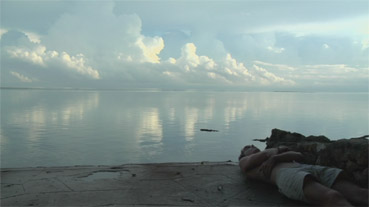
Max is a mumbler, but dialogue is just as clear as the seawater, so you're never straining to hear any of his awkward utterances. Same goes for the subtitled Jamaican/English dialect which comes through loud and clear without having to read it on screen. The musical spots featuring the likes of MGMT, Santigold and Mr Lexx are the only instances where the surrounds come alive, though the Mix favours subtle nuance over bombast, mixing the cues seamlessly with the on set sound and atmospherics. As The Congos perform under the moonlight, it feels and sounds as though you've got the best fireside seat in the house.
One of the more eclectic and frustrating set of extras I've come across in a while. The lack of context or explanation for segments titled "Recording A Recording", "Big Boat Ride" and "Turn Them (Live at Franks)" doesn't exactly make you want to dive right in. However, it's a more than worthwhile collection if only becomes Network have chosen to forgo the standard inclusion of EPK love-ins and making of documentaries featuring more clips from the finished film you've just watched than they do talking heads.
Recording a Recording (10.27)
An on set assemblage of dentally-challenged locals giving us their musical stylings as if they were auditioning for the Jamacian X-Factor. Actor Carl Bradshaw preaches/rambles in much the same way his Rasta prophet does in the film to anyone he encounters on the street and we are instructed on the proper way to eat a vegtable that looks like a bulbous flower and that eating it with swordfish, onions and black peppers makes for a classic Jamacian dish.
Big Boat Ride (11:08)
A short film that plays like the schematic for the high seas portion of Wah Do Dem, with co-director Sam Fleischner finding himself in many of the same situationas as Sean Bones, though I found this a lot more humorous than its feature-length, Sam failing to spark the interest of a yoga instructor and turning up to to a "meet the neighbors on your hall" event in his dressing gown and sloshed on wine. The scenes below decks when Sam stumbles across all the needless laundry that is done day in day out and the sheer number of people employed in cramped quarters just to keep the holidaymakers entertained hints at another film altogether that is never elaborated on and the most most interesting character of all, a high-powered CEO who spends $100 a day on massages is only briefly overheard before the short ends. There's a worthy boat-bound feature to be made out of these eleven minutes alone, so here's hoping this isn't the last time Chance and Fleischner take to the water.
Deleted Scene (1:24)
One scene too many of Max being hit on by his pushy 'gym buddy'.
The Congos in Concert (5:17)
More of the full-moon, by firelight performance featured in the film.
Turn Them (Live at Frank's) (5:15)
Sean Bones invites his co-star Norah Jones up on stage to perform with his band. Jones, meets his band mates for the first time, including Sean's Brother on drums. The fictional romantic couple share vocal duties while Bones plays guitar. There's nothing remarkable about the reggae infused She & Him style track, but the easy chemistry of two people still getting to know one another is notably on display, at least until Jones threatens to dump Bones again at the end of the performance. It serves as another reminder of how I missed a fuller exploration of the couple's relationship in the film itself and with my eye on Jones throughout, just wishing they'd found her something with more to do. When a role is that brief, surely it's worth including a sound bite from Jones on why she took it on and how she came to be involved with the project.
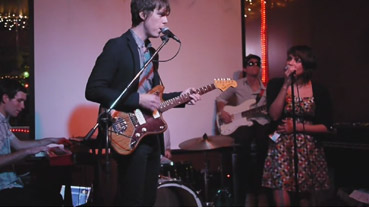
Suckers Music Video (4:00)
We're not given the title of the song, but this is the band playing in the same location that features them in the film, the bar Max goes to after Willow breaks up with him. It's a one angle job, needleslesly colourized with a cheap-looking photo booth filter.
Trailer (1.55)
Opens with a scene not in the final cut of Max getting high while listening to reggae. It cuts together all his travel disasters in a way that makes him come across as much more of an agitated tourist abroad, with an urgency that doesn't register when you watch the film. As well as being splattered with adjectives from critics and listing the key festivals it played at, the trailer features a nice Jamaican twist on the 'coming soon' card at the end.
A beautifully shot, worthy attempt to inject new live into a once thriving sub genre that for all its immediacy, comes up empty. On their next outing, directors Ben Chance and Sam Fleischner need to batten down a script before they find a visual comfort zone, and a story instead of a placeholder for what they want to show on screen. Until then, file this alongside the mounting evidence of the term 'slacker' fast becoming a byword for the stagnation of what used to be a unique and compelling brand of American indie,
|